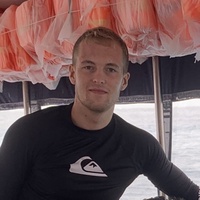
Research PG
- About
-
- Email Address
- e.sibley.20@abdn.ac.uk
- Office Address
National Decommissioning Centre
Main Street
Newburgh
Ellon
Aberdeenshire AB41 9AR
- School/Department
- School of Biological Sciences
Biography
Edward Sibley holds a Masters in Ecological & Enivronmental Research (Distinction) and BSc Biology (First) from the University of Sheffield.
As a student on the National Decommissioning Centre (NDC)-Chevron anchor partnership, Edward's PhD combines high-frequency acoustic instruments known as Imaging Sonars with optical methods to study reef fish communities, particularly those on tropical oil and gas structures.
Edward is applying his experience studying tropical coral reef fish communities to the oil and gas industry, with a focus on developing monitoring methods that can ultimately inform management of tropical oil and gas structures and their associated fish assemblages. Based at the NDC, Edward is focusing his research efforts on Chevron's oil and gas assets in several regions, including Angola, Thailand and Australia, as well as developing novel, sonar-based approaches to quantify reef fishes.
Qualifications
- MRes Ecological and Environmental Research2019 - University of Sheffield
- BSc Biology2018 - University of Sheffield
- Research
-
Research Overview
The Ecology and Distribution of Fishes on Tropical Oil and Gas Structures
Current Research
The offshore expansion of the oil and gas industry has resulted in the installation of thousands of artificial structures across the oceans. In tropical regions, these Oil and Gas Structures (OGSs) coincide with some of the most biodiverse habitats on Earth, most notably coral reefs. Despite occupying a far smaller area than coral reefs, OGSs provide complex artificial habitat for reef fishes, utilised for refuge, foraging and reproduction. Consequently, tropical OGSs house highly diverse fish communities, leading to debate as to the ecological impact of removing structures upon reaching the end of their operational lives. Alternatives to removal, including leaving OGSs intact, are widely advocated. However, a greater understanding of how fishes utilise OGSs is needed before deciding the fate of obsolete structures. To that end, Edward's PhD aims to resolve several prominent questions regarding OGS fish communities, including:
- How are OGS fish communities distributed across vertical and horizontal distances?
- How do fishes utilise the physical structure of OGSs?
- What monitoring methods are most appropriate for studying OGS fish communities?
By furthering our understanding of these topics, Edward hopes to shed light on the value of OGSs to tropical fish communities, at a time when the future sanctity and stability of tropical marine ecosystems are uncertain.
Supervision
Supervisors:
Professor Paul Fernandes
Dr. Alethea Madgett
